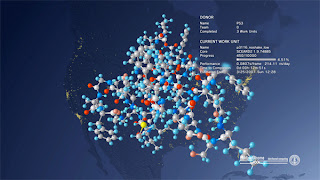 This holiday season Sony sold 1.2 million PS3 consoles. Congrats to all those new PS3 owners! Not only are you playing next gen games like Call of Duty 4 MW, you're enjoying movies in HD 1080p glory, you can also be proud that your console is powerful enough to help with the research of various diseases, such as Parkinson's, Alzheimer's, cystic fibrosis and many cancers. The program harnesses the unused processing power of the Cell chip, and perform computationally intensive simulations of protein folding and other molecular dynamics .These simulations can take up to 30 years for a single computer to complete, Folding@home enables this task to be shared among thousands of computers connected via the network ... The Cell/B.E. Did you know processor inside each PS3 is roughly 10 times faster than a standard mainstream chip inside a personal computer (PC), so researchers are able to perform the simulations much faster, speeding up the research process?!
This holiday season Sony sold 1.2 million PS3 consoles. Congrats to all those new PS3 owners! Not only are you playing next gen games like Call of Duty 4 MW, you're enjoying movies in HD 1080p glory, you can also be proud that your console is powerful enough to help with the research of various diseases, such as Parkinson's, Alzheimer's, cystic fibrosis and many cancers. The program harnesses the unused processing power of the Cell chip, and perform computationally intensive simulations of protein folding and other molecular dynamics .These simulations can take up to 30 years for a single computer to complete, Folding@home enables this task to be shared among thousands of computers connected via the network ... The Cell/B.E. Did you know processor inside each PS3 is roughly 10 times faster than a standard mainstream chip inside a personal computer (PC), so researchers are able to perform the simulations much faster, speeding up the research process?! According to Guinness, the PS3 accounts for about 60% of all teraFLOPS performed!On September 16, 2007, the Folding@Home project officially attained a performance level higher than one petaFLOPS, becoming the first computing system of any kind to do so, although it had briefly peaked above one petaFLOPS in March 2007. In comparison, the fastest supercomputer in the world (as of November 2007, IBM's Blue Gene/L supercomputer) peaks at 478.2 teraFLOPS (1000 teraFLOPS=1 petaFLOP).
So when you're not playing dinner time or when your about to call it a night go fold! On December 19th, Sony updated the Folding@Home client to version 1.3 to allow users to run music stored on their hard drives while contributing. Another feature of the 1.3 update allows users to automatically shut down their console after current work is done or after a limited period of time.
No comments:
Post a Comment